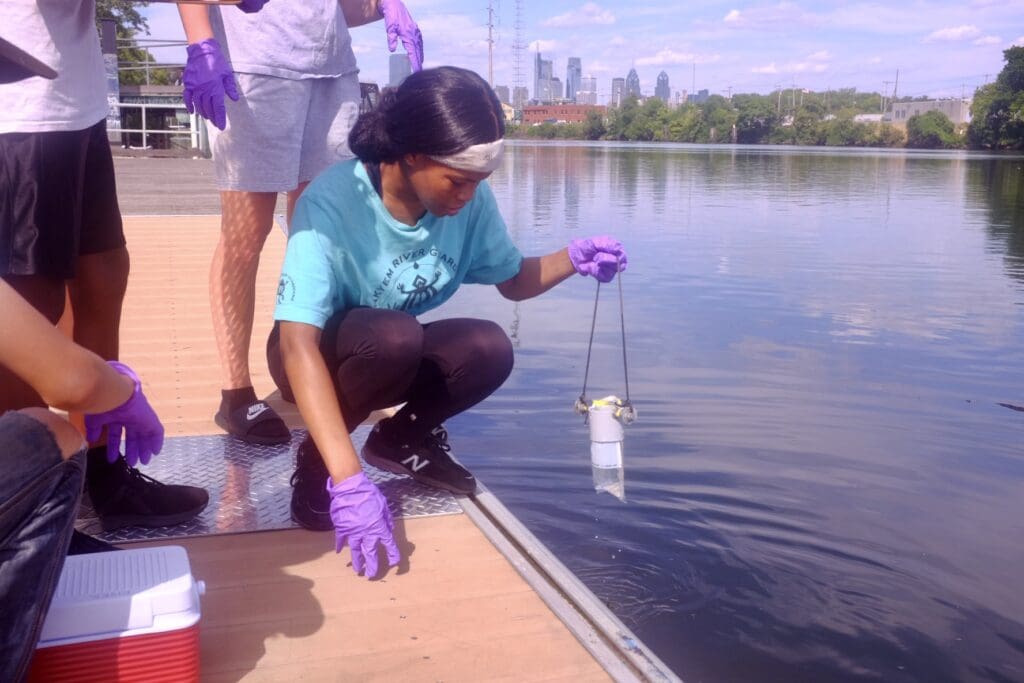Spotlight on Water Quality Monitoring

This article was written by Valerie Onifade, River Program Coordinator, and Chloe Wang, River Program Manager for the print version of the April 2024 Bartram’s Garden collaboration with the Southwest Globe Times newspaper.
As we prepare for the exciting return of public River Programs such as Free Fishing and Free Boating, it’s also time to dust off our water sampling equipment and start collecting weekly water samples once again. As you’re reading this, you might be wondering, “Wait, Bartram’s monitors water quality?” Since 2018, our staff, interns, and volunteers have been conducting weekly sampling of the river water at our public dock to assess E.coli bacterial levels and other parameters in the river!
The Tidal Schuylkill is enjoyed by thousands of visitors who participate in free river programs each season at the Bartram’s Garden Community Boathouse. We and our non-human friends, like the 40 species of fish that thrive in the river today, enjoy our river because of the vast improvement in water quality spurred by the closing of coal plants and factories at the end of the 20th century. However, this section of the river still experiences a frequent source of pollution that affects the safety of close contact with the water.
The lower, tidal portion of the Schuylkill River (between Fairmount Dam and Fort Mifflin) is lined with 40 combined sewer outfalls (CSOs) that can discharge untreated municipal sewage and stormwater into the river when it rains. This context cannot be ignored in our efforts to offer free river activities like boating and fishing. The combined sewer system that serves much of Philadelphia is designed to handle both wastewater and stormwater in the same pipe, but when there’s heavy rainfall or snowmelt, the sewer pipes or treatment plants may not be able to handle the increased flow. In such cases, the EPA allows Philadelphia, along with other cities with combined sewer systems, to discharge excess wastewater into nearby water bodies to prevent safety issues caused by flooding.[1] The Philadelphia Water Department provides online tools called Philly RiverCast and CSOcast, to help us know if the water is safe for recreational activities. However, Philly RiverCast is based on conditions in the Schuylkill above Fairmount Dam, outside the influence of the CSOs we deal with on the lower portion of the river, where Bartram’s Garden is located.[2]
Our water sampling efforts supplement the data that the Water Department collects and are also specific to our little stretch of the Schuylkill River. This is an essential part of our commitment to ensuring the health and safety of our community. We focus our sampling efforts on E.coli bacteria levels because this is the specific bacteria that the Pennsylvania Department of Environmental Protection (DEP) and the US Environmental Protection Agency (EPA) use to define water quality standards for activities such as boating. We also host an EnviroDIY Mayfly monitoring station in the river near our dock that measures and records physical and chemical properties of the water. Sampling the water over time allows us to observe patterns and look out for what environmental factors might correlate with high bacterial counts. We’ve learned that bacteria levels are variable, meaning they are affected by so many factors that we cannot predict them based on one thing.
However, the data collected over time combined with rainfall records have informed our protocol of canceling our Free Saturday Boating program in the event of at least 0.25 inches of rainfall within the previous 24 hours. This means that even on a beautiful, sunny Saturday, we sometimes have to cancel due to rain on Friday. On the day of a scheduled program, you can always check the calendar at bartramsgarden.org or look on our Facebook or Instagram page for cancellation announcements, which are posted at least two hours before the start time, or call the Welcome Center at (215) 729-5281.
In addition to evaluating our own policies, we also advocate for the Department of Environmental Protection to collect more water quality data and reassess recreational use assessments of the Schuylkill River. We look forward to a future where we’ll be talking about the huge improvements in water quality as a result of City investment in traditional and green infrastructure and CSO reductions.
You can learn more about our water quality monitoring and advocacy here!
[1] Recreation in Philadelphia’s Waterways: What to Know – Philadelphia Water Department


